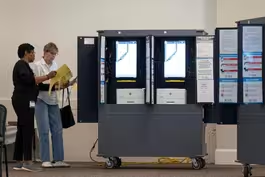
Companies scale back DEI plans after conservative backlash
Clip: 8/27/2024 | 6m 44sVideo has Closed Captions
How some companies are scaling back DEI initiatives after conservative backlash
Diversity, equity and inclusion programs are under attack by conservative lawmakers and activists. From college campuses to corporate America, the fear of legal liability and political backlash is leading some to backtrack or rebrand their DEI initiatives. Geoff Bennett discussed more with Simone Foxman of Bloomberg News.
Problems playing video? | Closed Captioning Feedback
Problems playing video? | Closed Captioning Feedback
Major corporate funding for the PBS News Hour is provided by BDO, BNSF, Consumer Cellular, American Cruise Lines, and Raymond James. Funding for the PBS NewsHour Weekend is provided by...

Companies scale back DEI plans after conservative backlash
Clip: 8/27/2024 | 6m 44sVideo has Closed Captions
Diversity, equity and inclusion programs are under attack by conservative lawmakers and activists. From college campuses to corporate America, the fear of legal liability and political backlash is leading some to backtrack or rebrand their DEI initiatives. Geoff Bennett discussed more with Simone Foxman of Bloomberg News.
Problems playing video? | Closed Captioning Feedback
How to Watch PBS News Hour
PBS News Hour is available to stream on pbs.org and the free PBS App, available on iPhone, Apple TV, Android TV, Android smartphones, Amazon Fire TV, Amazon Fire Tablet, Roku, Samsung Smart TV, and Vizio.
Providing Support for PBS.org
Learn Moreabout PBS online sponsorshipGEOFF BENNETT: Diversity, equity, and inclusion, or DEI, programs are under attack by conservative lawmakers and activists.
From college campuses, to corporate America, the fear of legal liability and political backlash is leading some to backtrack or rebrand their diversity initiatives.
In the last few weeks, there have been a number of high-profile companies announcing changes, the latest, home improvement retailer Lowe's.
That follows similar moves by Harley-Davidson, John Deere, and the maker of Jack Daniel's whiskey.
For a closer look, we're joined by Simone Foxman, who's covering all of this for Bloomberg News.
Thanks for being here.
SIMONE FOXMAN, Bloomberg News: Thanks for having me.
GEOFF BENNETT: Let's start with a definition of what DEI is.
How do DEI efforts differ from longstanding efforts to diversify and increase the talent pool at the workplace?
SIMONE FOXMAN: Well, in the workplace, people who oversee DEI efforts, some of them call them the variety of EDI, DNI.
It just means to diversify the workplace.
And exactly what that means is different from company to company.
It's different from DEI professional to DEI professional, from one CEO to another.
And that's kind of part of why DEI as an acronym has become this charged, very controversial term recently.
GEOFF BENNETT: And what's driving the backlash?
SIMONE FOXMAN: Well, part of it is this woke/anti-woke culture war idea.
A lot of these diversity, equity and inclusion programs were really ramped up, if not put into place and to begin with, after the murder of George Floyd back in 2020.
So, companies made hundreds of billions of dollars' worth of commitment to say we want more diverse people in our work force and we want to help diverse communities, chiefly people of color.
That all sort of started to change around the time we saw that backlash against ESG, environmental, social, and governance.
It's one of these buzzwords that really has to do with a certain form of investing, but has become this culture war topic.
So the S, the -- is the DEI piece, and that's really what's come under fire recently, especially since the Supreme Court rolled back affirmative action in 2023.
GEOFF BENNETT: So, as we mentioned, Lowe's joins Tractor Supply, Harley-Davidson, the maker of Jack Daniel's whiskey in paring back their DEI programs.
What's the through line?
Why are these companies in particular scaling back?
SIMONE FOXMAN: So these companies have all been targeted by a social media influencer by the name of Robby Starbuck.
And unlike other conservative activists, Robby Starbuck, he's not a lawyer.
He's just the guy online who is bringing attention to what he calls woke policies at retailers or at companies that have a lot of consumer interest, where he believes those consumers don't want the companies to be adopting those policies.
For example, if you go out into Middle America and very rural communities, you're likely to find a higher number of more conservative people that might not be as interested in seeing trans workers at Tractor Supply, say, being provided with health care.
So he's essentially trying to blend the potential conservative impulses of certain groups of people with what their corporate policies are doing and say, hey, there's a disconnect here.
And he's been extremely effective.
These couple campaigns have just come in the last two months, since -- actually about three months since early June.
So we have seen a lot of movement on the corporate front.
One of the things I think we have to ask ourselves, though, is whether or not these companies were ever really as committed to diversity, equity, and inclusion efforts, the same efforts they're rolling back now, as they said they were, no matter what the headlines were, the press releases said two years ago.
GEOFF BENNETT: Well, looking at the data, white men still control about 60 percent of the top leadership roles, while making up about 30 percent of the U.S. work force.
That's according to federal workplace data.
So that raises two questions.
One is the concern among these conservative activists misplaced?
But the question I will put to you is, are these DEI initiatives actually working?
SIMONE FOXMAN: We have seen some very limited movements with respect to people of color and women in positions of senior leadership.
But, actually, white women have been the key beneficiaries of DEI policies to date.
When we talk about whether or not this has filtered down to all communities of color, women of color, perhaps, I think it's harder to see the dramatic movement.
I think the hope was, especially with the policies that came into place after the murder of George Floyd, actually, if we just all really put all our efforts into trying to diversify our work forces, we will see more movement than we have.
We have seen some movement.
The numbers are really small.
I think it's about 9 percent of senior leadership roles are now held by people -- by Black people, where they make up 14 percent of the population.
But it's small.
It's like 7 percent to 9 percent, something like that.
GEOFF BENNETT: Setting aside the political aspect of all of this and the culture war aspect of all of this, there are advocates for diversity who say that it's -- you can make a good business case for it, that ensuring -- having a workplace that has a diversity of views in the room usually makes for better business.
SIMONE FOXMAN: That's something, frankly, even, I guess, opponents of DEI, some of them do say that.
I think there's really three groups of people, right?
There are the really pro-DEI folks who are pushing some of these policies, often special programs for people of color or women to help them get ahead in ways they haven't before.
There is a middle group, I think, that says, well, we respect the idea of diversity in our boardroom, in our workplace, but we don't think those policies are necessary.
And then you probably have a group of people who say, well, we're white men or we're white people and we want to hold on to our -- the power that we have in this society.
And that's a different group of people.
Frankly, no one is -- I think there's some crossover between the two groups, the two first groups I mentioned, and no one's really kind of speaking to the intersection of them, which is why activists on all sides are so loud and they're really dominating the conversation.
GEOFF BENNETT: Simone Foxman, equity reporter for Bloomberg News, thanks for being here.
Appreciate it.
SIMONE FOXMAN: Thank you.
Alsu Kurmasheva on life back home after release from Russia
Video has Closed Captions
Clip: 8/27/2024 | 9m 41s | Alsu Kurmasheva on adjusting to life back home after release from Russian detention (9m 41s)
Israel rescues hostage from Hamas tunnel in Gaza
Video has Closed Captions
Clip: 8/27/2024 | 2m 53s | Israel rescues hostage from Hamas tunnel in Gaza (2m 53s)
People with disabilities face extra hurdles for housing
Video has Closed Captions
Clip: 8/27/2024 | 10m 26s | People with disabilities face extra hurdles amid national housing shortage (10m 26s)
Plan offering legal status to undocumented spouses paused
Video has Closed Captions
Clip: 8/27/2024 | 4m 45s | Judge puts hold on Biden program offering legal status to undocumented spouses of citizens (4m 45s)
Voting rules in swing states could affect election results
Video has Closed Captions
Clip: 8/27/2024 | 8m 1s | New voting rules in battleground states could affect election results (8m 1s)
Why the special counsel filed a new indictment against Trump
Video has Closed Captions
Clip: 8/27/2024 | 4m 36s | Why the special counsel filed a new Jan. 6 indictment against Trump (4m 36s)
Providing Support for PBS.org
Learn Moreabout PBS online sponsorship
- News and Public Affairs

FRONTLINE is investigative journalism that questions, explains and changes our world.

- News and Public Affairs

Amanpour and Company features conversations with leaders and decision makers.












Support for PBS provided by:
Major corporate funding for the PBS News Hour is provided by BDO, BNSF, Consumer Cellular, American Cruise Lines, and Raymond James. Funding for the PBS NewsHour Weekend is provided by...






